- Home
- Alex Archer
Seeker’s Curse Page 3
Seeker’s Curse Read online
Page 3
What bothered her was the brush with authority. Aside from the chance of harming an innocent person, which she couldn’t stand, tangling with law enforcement carried the risk of bringing her to official attention. That could prove disastrous. Even deadly.
She sighed. The books weren’t yielding any helpful hints of connections between ancient Greece and Nepal. None of the ones she’d pored through so far so much as mentioned Nepal. It just wasn’t a place you thought of in conjunction with Greece. Rome, Persia, Turkey, Egypt—but Nepal? Sure, they occupied the same continental landmass, and not even its extremities. But it was a big landmass.
A hand suddenly reached past Annja into the yellow spill of light. Strong-looking fingers plucked up the coin, turned it obverse and reverse in the light of the reading lamp. The hand engulfed it and withdrew.
“It is ancient Macedonian,” a baritone voice said in Greek-accented English. “It bears the likeness of Alexander the Great, Ms. Creed.”
Heart in throat, she turned. And found herself looking into a pair of piercing dark eyes.
She seemed to just sort of swirl right into them. Her stomach did a slow roll. She heard a buzzing in her ears.
It was the special operator she had seen in the Kastoria warehouse.
Though her body felt frozen she took in details. Up close he was even more breathtakingly handsome than he had been in the smoky, dusty, ill-lit warehouse. Curly black hair framed a face at once rugged and youthful, with a strong aquiline nose. His rangy athletic form was clad in a light gray houndstooth jacket over what seemed to be a dark gray shirt with an open collar.
“I am Sergeant Pantheras Katramados,” he said. “I am with EKAM, special forces of the Hellenic police. And you are under arrest for trafficking in illicit antiquities.”
“I haven’t done any such thing,” Annja said, fighting to keep her composure.
“You were seen in the company of the notorious antiquities smuggler Enver Bajraktari and his gang during a warehouse raid in Kastoria, in northern Greece,” he said. He smiled grimly. “Not to put too fine an edge on it, I was the one who saw you. And then there’s this.”
She turned in her chair as he held up the coin. It glinted in the lamplight. “You are in possession of a stolen artifact. That may prove the least of your difficulties from a legal standpoint.”
Questions crowded in her mind, jostling each other along with protestations of outraged innocence. Well, she felt outraged, and knew that in any meaningful sense she was innocent. Whether she could convince the handsome sergeant of the fact was a different issue.
What popped out first was, “How did you identify me?”
He raised an eyebrow at her. “You will not attempt to convince me it is a case of mistaken identity?”
She shook her head. “On the contrary. I want to impress you with my good faith so you’ll listen to what I have to say.”
“You looked familiar,” he said. “Later it struck me I had come face to face with the famous Annja Creed, of the American television program Chasing History’s Monsters.”
He grinned. “I’ve always been something of a fan,” he said. “I am an archaeologist, too, as it happens.”
She sighed. Under other circumstances her heart would be fluttering at the announcement by this gorgeous young man that he was a fan of hers.
Instead she felt as if she teetered on a tightrope, with flames to one side and spikes on the other. On the one hand she feared disclosure—discovery. Getting arrested and publicly tried, even if acquitted, would attract attention that might make doing her work—her real work, both as an archaeologist and as the not-altogether-willing successor to Joan of Arc—impossible. A conviction would certainly sink her, both with the television show and as an academically respected archaeologist.
On the other hand was the dread that the Greek national cops might just disappear her. They hadn’t always had the best reputation where torture was concerned. There was always a chance that this smiling man’s employers might simply stash her away somewhere until she told them what they wanted to hear.
She figured her only chance of making it across that chasm was to convince handsome Sergeant Katramados that she was more use to him and his bosses at large than in a cell somewhere.
All this flashed through her mind in a desperate instant. “All right,” she said. “Don’t take me in yet. I’ll tell you what I know. Then you can decide what action to take.”
He looked doubtful. “You’re not going to bluster?” he asked, his tone gently humorous. “Not threaten me with lawyers and the U.S. Embassy?”
She shook her head. “To be candid with you, Sergeant, I think the goodwill I’d give up by playing it that way is more important than any of those other things.”
“You are probably wise,” he said, “to trust neither our judicial system nor your ambassador. But let me advise you not to try to bolt on me. You seem to be very fleet. I could not afford to take it easy on you if you did so.”
“I won’t,” she promised.
“Very well. Let us go somewhere private and you can tell me everything.”
“NOW,” HE SAID, settling in on a backward-turned chair. “What is it you wish to say to me, Ms. Creed?”
Annja would’ve thought the largely deserted reading room of the library was as private as it got. But with a word to a passing assistant, backed up by a flash of his credentials, Sergeant Katramados had gotten exclusive use of a small room with chairs, a table and lockable doors that was probably used for meetings and classes.
Now the doors were locked. It was just the two of them.
“You must understand you hold no strong position here,” the officer said gravely. “We have no record of Annja Creed entering Greece legally at the time of the Kastoria raid. And with my own eyes I saw you meeting with former Kosovo Liberation Army members affiliated with al-Qaeda.”
He crossed his arms on the chair back and regarded her for a moment. “Along with being familiar with your TV work, I hear rumors that you are known to quietly take on certain commissions outside the orbit of conventional academic archaeological fieldwork.”
Outrage overcame Annja’s fears. “I would never do anything unethical from an archaeological standpoint.”
“Your name has been connected to certain suspect parties. Before Bajraktari.”
“To preserve archaeological treasures—or human lives—I’d deal with the Devil himself,” she said.
That got a brief laugh.
“Sometimes one must indeed do so,” he said.
Annja drew a deep breath. “I was hired by the Japan Buddhist Federation,” she said, “to survey and preserve Buddhist shrines in Nepal.”
The truth, she had decided, was her best weapon under the circumstances. Or her best chance.
While Sergeant Pantheras Katramados had started out stern, if scrupulously polite, what struck Annja as a natural affability began to shine through. She also felt a definite chemistry between them. She doubted he would let it affect his judgment. Nor would she. But she couldn’t deny it.
So she told him the truth, with just a few select omissions. Such as anything to do with her mentor Roux. And most especially the sword.
“Is that the best story you can come up with?” he asked her.
She shrugged. “It’s the truth. Truth doesn’t always make the best story. Or even the most plausible sounding one.”
“You might claim to be working undercover as a reporter investigating the international trade in plundered antiquities for your program,” he pointed out.
Look, you’re confusing me, she wanted to say. Whose side are you on, anyway?
“I could. But my best chance of walking out of here as anything but a prisoner is to stay on your good side. If you catch me in a lie, I don’t think you’ll feel like cutting me any slack.”
He grinned. “You’re right.”
She knew the Japan Buddhist Federation hadn’t passed on the Bajraktari lead to police yet because they wanted to
follow up on it first. Annja was fine with that. She had nothing against the police, although she lacked the reflex trust of anything in a uniform so many people displayed.
In general Annja felt more concerned about what was good and right than what was legal. Or not.
Sergeant Katramados knit his fingers together and rubbed his chin and lower lip absentmindedly with a thumb.
“You were either very brave or very foolish, Ms. Creed,” he said, “to put yourself in such a situation.”
She scowled and shook her head. “I guess on evidence it turned out to be foolish. Much as I hate to admit it, it never occurred to me they might decide to grab me for ransom.”
“Kidnapping is a growth industry in the Balkans these days.”
“Evidently I should have done a bit more research on the modern era.”
“You were lucky to escape with your life.”
She frowned slightly. “I’m resourceful,” she said, “and I’m totally determined to be nobody’s victim.”
He cocked a brow again. She shrugged.
“And sure, I was lucky. Especially when you and your friends came busting through the skylight,” she admitted.
“Speaking of the warehouse battle,” he said, “some mysteries exist which I hope you might be able to clarify for me.”
The subtext that it could help her case remained unspoken, though unmistakable. She gave him points for not saying it aloud, though.
“Which ones?” she asked.
“One of the bodies bore severe stabbing or slashing wounds. Have you any idea how that came about in the midst of a gun battle?”
“Some of the gang members wore knives, I noticed,” Annja said. “They might’ve fallen out, blaming each other for betrayal. Or perhaps the attack provided the pretext to work out internal gang politics, personal rivalries, even take revenge. Who knows, with violent criminal types?”
“Kosovar and Albanian gangs tend to be both violent and unpredictable, it’s true,” he said, looking and sounding as if he didn’t like the taste in his mouth. “But these wounds were inflicted by a weapon with a very long blade. Not pocket knives or even belt knives.”
She smiled and shrugged. “Surely you don’t suspect me of packing a concealed sword? I wasn’t even wearing a coat.”
He looked at her, his long handsome face unreadable in the questionable dim light. Long strong fingers drummed the tabletop briefly.
“No,” he said. “I suppose not. It would seem impractical at best.”
He showed his teeth in a grin. It was an infectious smile. Annja was too savvy to let it put her off her guard.
She felt a certain smugness over the sword ploy. When you said it flat out like that, it sounded so completely absurd that it would weaken any suspicions he harbored about the dead men’s wounds. She hoped, anyway.
“So, what are you researching here?” he asked.
She shrugged. “Classical Greece isn’t really my area. I’m trying to refresh my knowledge. Particularly I’m looking for anything that can help me figure out why Greek coins are turning up in plunder from a Buddhist shrine in Nepal.”
“Macedonian,” he corrected.
“Macedonian. Right. You mentioned that. Might that have something to do with it?”
He stood up and smiled at her. “I’ll let you pursue that on your own,” he said.
“This means I’m not arrested, yes?”
“For the moment.” He frowned pensively. “It might be better to take you in,” he said, “strictly for your own good. Our informant inside the gang tells us that Bajraktari blames you for setting them up. He intends to take vengeance. It is a major reason I’m inclined to believe you.”
Annja swallowed. “Might the gangs have spies of their own in the Hellenic police?”
He shrugged. “Such infiltration is a problem,” he said. “Our particular task force consists only of handpicked and proven men and women—it’s part of the reason we exist. But we lack the resources to provide you a safehouse. You would have to go to jail.”
There’s a happy prospect, she thought. “Meaning you’d have to get cooperation from other Hellenic police. And you can’t take for granted they haven’t been compromised.”
He spread his big, strong hands. She recognized the typical stand-up cop’s dilemma. On the one hand he hated to criticize a fellow law-enforcement officer, especially within his own department. On the other, he was too perceptive and honest not to know there were dirty cops in his house.
“I have not said it,” he said, confirming her suspicion.
It cut against her grain to roll over completely. “So, what’s a door-busting commando type doing in a library in Athens?” she asked.
Katramados laughed. “The same thing as you—studying. I did serve in EKAM for a time as a commando, as I did in the Hellenic army’s special forces. Now I work primarily as an investigator with an organized-crime unit of the national police, dedicated to suppressing the trade in illegal antiquities. Though, as you know, I still take active part in certain raids.”
“I noticed.”
“As it happens, along with a knack for detective work I have a lifelong love of Hellenic archaeology. Especially as pertains to my native Macedonia. The force finds it useful to pay for me to get my degree.”
His smile turned a bit shy. “One day I hope to lead the fight against antiquities thieves. I admit, that’s quite a leap from my current lowly status.”
I’ll bet you’re a fast-tracker, Annja thought, despite the humble act. Although to be fair she had to admit it didn’t really seem to be an act.
“What now?” she asked.
“It would appear you owe me a debt for saving you from terrorist thugs, Ms. Creed.”
She frowned. “I had things under control.”
“Perhaps,” he said.
She shrugged. She didn’t want to go too far down that road, either. “Okay. I admit I got in over my head in Kastoria. But that’s a reason I try to fly under the radar. It’s just not possible for an archaeologist affiliated with a university or other big institution to do those things. But they have to be done.”
“So much is true,” the young police commando said. “But again, please keep in mind the kind of risks you run.”
“They’re seldom far from my mind. I promise.”
“Then I shall leave you to your research. I accept your story. For now. But I shall keep an eye on you, Annja Creed.”
4
“So,” Annja said through the steam rising from her cup of intense Turkish-style coffee, “I remember from my history that Alexander the Great made it all the way into India. But somehow I never quite associated that with Nepal.”
Pan Katramados nodded gravely. “He conquered much of northern India. I doubt he specifically set out to take Nepal. It mostly came as part of the package.”
He grinned. He did that readily enough, Annja was finding out. She grinned back.
Traffic beeped and jingled on the street running around the flank of Strefi Hill in north Athens’s Exarcheia district, not far from the archaeological museum. The air was cool and smelled as much of the evergreens that thickly forested the crown and far side of the hill as much as it did of traffic and roasting coffee beans. The morning spring sun, though, warmed any surface it reached fairly quickly. Annja found herself alternately moving into the sun when it got too cool under the table’s umbrella, then back into the shade when she grew uncomfortably warm.
Her companion looked around.
“Why the head-on-a-swivel bit?” she asked. “Concerned about Bajraktari?”
“Always,” Pan said. “But it’s mostly habit. This district is a notorious haven for drug dealers and anarchists.”
“Really?” Annja asked.
“It’s possible that police intelligence exaggerates the amount of drug dealing,” he said, “to allow for more actions against dissidents.”
Annja sipped her coffee and considered what Pan was saying. The whole point of EKAM—the s
pecial antiquities unit of the Hellenic police antiterrorist unit—was that the Hellenic Police in general had been penetrated by criminal spies, particularly for the brutal, well-armed and organized Balkan gangs. And here he was admitting behavior among his fellows that was ethically questionable at best.
It clearly caused pain to a good man who believed, as police were generally taught, that all law-breaking was wrong and that criminals were irremediably bad.
“So,” Pan said, visibly dragging his thoughts back to more pleasant pathways, “how go your researches into our Macedonian history?”
“I’m definitely getting up to speed on Alexander. And his father,” Annja said.
“Ah. King Philippos the One-Eyed. His son did enough to earn his name of Megas Alexandros. But the son gets credit for much his father did.”
“So I gather. I did know Alexander beat the army of King Poros. It turns out that part of Nepal was included in the conquered kingdom. Which would seem to explain how coins bearing Alexander’s likeness turned up in treasure stolen from Nepal.”
“But not necessarily why,” Pan said.
“That’s the sticking point. I’m going to have to go to Nepal to find the whole of that reason, I know. Then again, that’s what I was hired to do in the first place.”
“How long will you remain in Greece?”
“That implies I’ll be allowed to leave.”
“At this point the government knows nothing prejudicial to allowing you to do so,” he said, deadpan. As mobile as his long, olive features were, that in itself was significant. “For my part, as a professional matter I shall be glad to have you take your investigation to Nepal and out of the danger the gangsters pose to you. Provided that you send back any pertinent information you turn up. Sadly, our budget is too limited to allow any of our investigators to make the trip on the basis of the evidence we’ve gathered so far.”
“I promised I would,” she said simply. She had no intention of telling him everything she found in the troubled mountain republic—most wouldn’t be any business of his or his task force. But anything pertaining to the still-mysterious link between Albanian gangs and the land tucked up high in the planet’s mightiest mountain range, she’d be happy to pass on to him.

 Rogue Angel: Forbidden City
Rogue Angel: Forbidden City The Spider Stone
The Spider Stone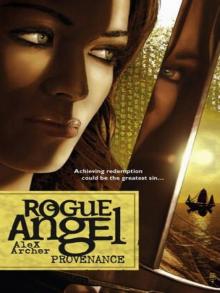 Provenance
Provenance Blood Cursed
Blood Cursed Fury's Goddess
Fury's Goddess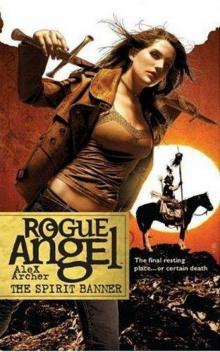 The Spirit Banner
The Spirit Banner Footprints
Footprints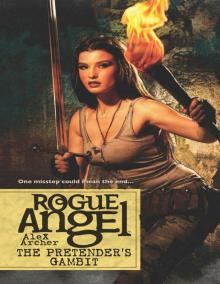 The Pretender's Gambit
The Pretender's Gambit Rogue Angel: The Lost Scrolls
Rogue Angel: The Lost Scrolls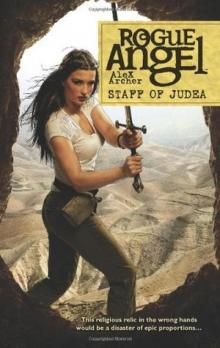 Staff of Judea
Staff of Judea Rogue Angel 55: Beneath Still Waters
Rogue Angel 55: Beneath Still Waters The Mortality Principle
The Mortality Principle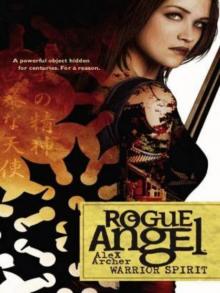 Warrior Spirit
Warrior Spirit Paradox
Paradox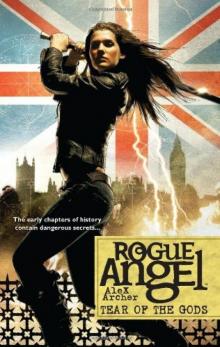 Tear of the Gods
Tear of the Gods Forbidden City
Forbidden City River of Nightmares (Rogue Angel)
River of Nightmares (Rogue Angel) Rogue Angel: The Secret of the Slaves
Rogue Angel: The Secret of the Slaves Destiny
Destiny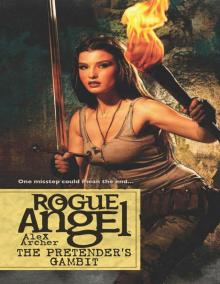 Rogue Angel 51: The Pretender's Gambit
Rogue Angel 51: The Pretender's Gambit Celtic Fire
Celtic Fire Rogue Angel 54: Day of Atonement
Rogue Angel 54: Day of Atonement Day of Atonement
Day of Atonement Rogue Angel: Gabriel's Horn
Rogue Angel: Gabriel's Horn Grendel's Curse
Grendel's Curse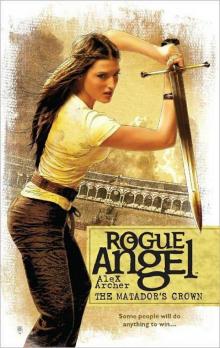 The Matador's Crown
The Matador's Crown Rogue Angel: The Chosen
Rogue Angel: The Chosen The Other Crowd
The Other Crowd Seeker’s Curse
Seeker’s Curse Rogue Angel 52: Death Mask
Rogue Angel 52: Death Mask The Golden Elephant
The Golden Elephant Blood Cursed (Rogue Angel)
Blood Cursed (Rogue Angel) Celtic Fire (Rogue Angel)
Celtic Fire (Rogue Angel) Gabriel's Horn
Gabriel's Horn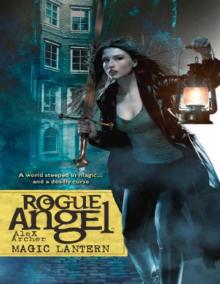 Magic Lantern (Rogue Angel)
Magic Lantern (Rogue Angel) God of Thunder
God of Thunder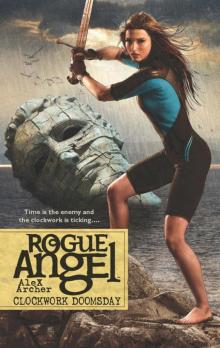 Clockwork Doomsday
Clockwork Doomsday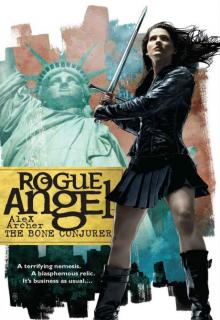 The Bone Conjurer
The Bone Conjurer Treasure of Lima
Treasure of Lima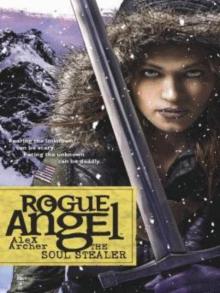 The Soul Stealer
The Soul Stealer The Dragon’s Mark
The Dragon’s Mark Restless Soul
Restless Soul Rogue Angel: God Of Thunder
Rogue Angel: God Of Thunder Rogue Angel 49: The Devil's Chord
Rogue Angel 49: The Devil's Chord Death Mask
Death Mask Rogue Angel 46: Treasure of Lima
Rogue Angel 46: Treasure of Lima Swordsman's Legacy
Swordsman's Legacy The Oracle's Message
The Oracle's Message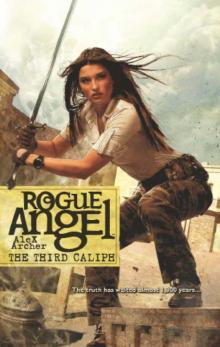 The Third Caliph
The Third Caliph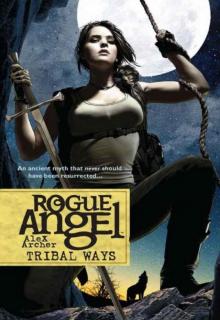 Tribal Ways
Tribal Ways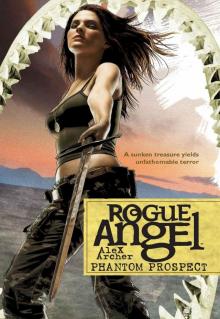 Phantom Prospect
Phantom Prospect Rogue Angel 50: Celtic Fire
Rogue Angel 50: Celtic Fire Library of Gold
Library of Gold Rogue Angel 53: Bathed in Blood
Rogue Angel 53: Bathed in Blood Sacred Ground
Sacred Ground The Devil's Chord
The Devil's Chord Serpent's Kiss
Serpent's Kiss The Vanishing Tribe
The Vanishing Tribe Sunken Pyramid
Sunken Pyramid Sunken Pyramid (Rogue Angel)
Sunken Pyramid (Rogue Angel)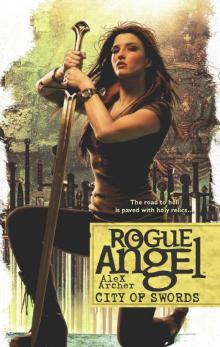 City of Swords
City of Swords Bathed in Blood
Bathed in Blood The Lost Scrolls
The Lost Scrolls The Babel Codex
The Babel Codex Mystic Warrior
Mystic Warrior Eternal Journey
Eternal Journey Beneath Still Waters
Beneath Still Waters Solomon's Jar
Solomon's Jar Beneath Still Waters (Rogue Angel Book 55)
Beneath Still Waters (Rogue Angel Book 55) Cradle of Solitude
Cradle of Solitude Secret of the Slaves
Secret of the Slaves River of Nightmares
River of Nightmares Polar Quest
Polar Quest False Horizon
False Horizon